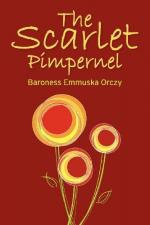“’Tis true,” said one of those who had been most active in rummaging through Mole’s grimy rags. “There’s nothing to be found on him.”
But suspicion once aroused was not easily allayed. Mole’s protestations became more and more vigorous and emphatic. His papers were all in order, he vowed. He had them on him: his own identity papers, clear for anyone to see. Someone had dragged them out of his pocket; they were dank and covered with splashes of mud—hardly legible. They were handed over to a man who stood in the immediate circle of light projected by the lamp. He seized them and examined them carefully. This man was short and slight, was dressed in well-made cloth clothes; his hair was held in at the nape of the next in a modish manner with a black taffeta bow. His hands were clean, slender, and claw-like, and he wore the tricolour scarf of office round his waist which proclaimed him to be a member of one of the numerous Committees which tyrannised over the people.
The papers appeared to be in order, and proclaimed the bearer to be Paul Mole, a native of Besancon, a carpenter by trade. The identity book had recently been signed by Jean Paul Marat, the man’s latest employer, and been counter-signed by the Commissary of the section.
The man in the tricolour scarf turned with some acerbity on the crowd who was still pressing round the prisoner.
“Which of you here,” he queried roughly, “levelled an unjust accusation against an honest citizen?”
But, as usual in such cases, no one replied directly to the charge. It was not safe these days to come into conflict with men like Mole. The Committees were all on their side, against the bourgeois as well as against the aristos. This was the reign of the proletariat, and the sans-culotte always emerged triumphant in a conflict against the well-to-do. Nor was it good to rouse the ire of citizen Chauvelin, one of the most powerful, as he was the most pitiless, members of the Committee of Public Safety. Quiet, sarcastic rather than aggressive, something of the aristo, too, in his clean linen and well-cut clothes, he had not even yielded to the defunct Marat in cruelty and relentless persecution of aristocrats.
Evidently his sympathies now were all with Mole, the out-at-elbows, miserable servant of an equally miserable master. His pale-coloured, deep-set eyes challenged the crowd, which gave way before him, slunk back into the corners, away from his coldly threatening glance. Thus he found himself suddenly face to face with Mole, somewhat isolated from the rest, and close to the tin bath with its grim contents. Chauvelin had the papers in his hand.
“Take these, citizen,” he said curtly to the other. “They are all in order.”
He looked up at Mole as he said this, for the latter, though his shoulders were bent, was unusually tall, and Mole took the papers from him. Thus for the space of a few seconds the two men looked into one another’s face, eyes to eyes—and suddenly Chauvelin felt an icy sweat coursing down his spine. The eyes into which he gazed had a strange, ironical twinkle in them, a kind of good-humoured arrogance, whilst through the firm, clear-cut lips, half hidden by a dirty and ill-kempt beard, there came the sound—oh! a mere echo—of a quaint and inane laugh.




